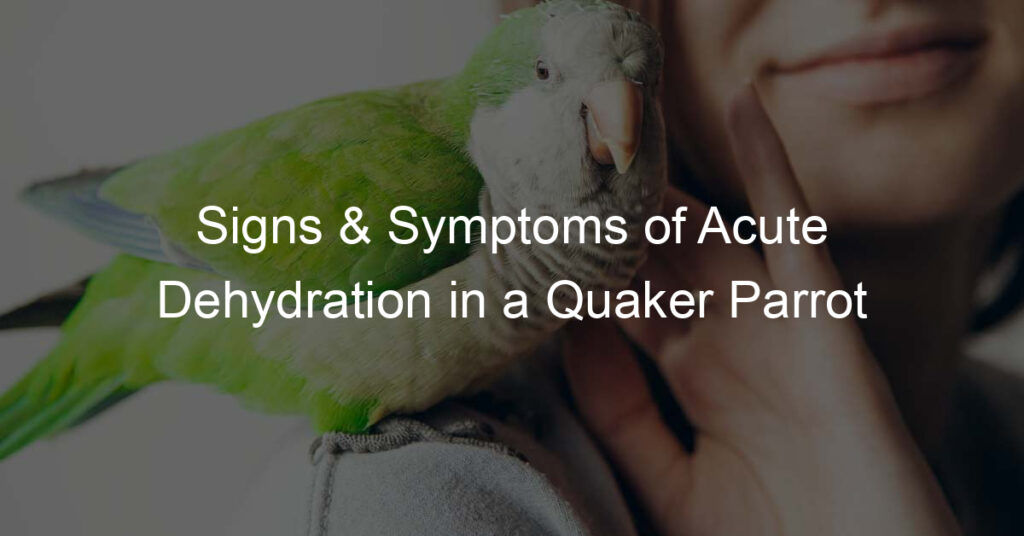Have you ever noticed your Quaker parrot panting? If so, it’s likely a sign of dehydration. In this blog post, we’ll talk about the signs and symptoms of acute dehydration in Quaker parrots, as well as what you can do to treat it. Keep reading to learn more!
Which of the following are signs of dehydration in a bird?
Dehydration in birds can be a serious issue that affects their overall health and well-being. Knowing the signs of dehydration and how to address it can help keep our feathered friends safe.
Signs of dehydration in a bird include feathers that are dry or matted, dull and lackluster eyes, an increased heart rate, clawing at water bowls, panting or excessive panting, and a decrease in energy levels.
If you suspect your bird is dehydrated, offer them fresh water in a shallow bowl as they may not be able to access deeper sources of water by themselves.
Adding electrolytes to their water can also be beneficial. If the symptoms do not improve then consult with your veterinarian immediately.
How long can parrots go without water?
Parrots are a species that require ample water to stay healthy and hydrated, and the amount of water they need depends on the individual’s size, diet, activity level, and climate; however, a consensus would be that parrots should receive fresh water daily.
If not provided with fresh water daily, parrots have the potential to go up to three days without water before their health starts becoming at risk for dehydration.
While each bird is different and should be monitored individually based on their needs, most experts agree that routine hydration can benefit the life and comfort of your parrot greatly.
How do you treat a dehydrated parrot?
Taking care of a dehydrated parrot requires quick action and thorough knowledge of the best methods for treating the condition. Many birds become dehydrated due to a lack of access to water, or because their food is extremely low in moisture content.
When observing a parrot that might be dehydrated, it’s important to keep an eye out for signs such as decreased activity, sunken eyes, or dry gums and beaks.
The first step in treating your parrot should be providing them with clean water around the clock, along with moist foods and treats like fruits and vegetables.
If the dehydration does not improve after 24 hours you should seek veterinary help as soon as possible since the longer it goes untreated, the more severe it can become.
By acting quickly when signs are present and maintaining a healthy diet for your parrot, any cases of dehydration will likely be resolved without serious complications.
How do you know if your parrot is dehydrated?
Parrots are susceptible to dehydration, so they must be mindful of their water consumption.
To tell if your parrot is dehydrated, look for signs that include listlessness or lethargy, dry-looking eyes, and nasal passages, a loss of feathers/feathers sticking together, sagging skin, and uncharacteristically high-pitched vocalizations.
Providing plenty of fresh water every day allows you to monitor their intake and remain vigilant for any signs of distress. Make sure to practice regular health checks by assessing overall weight and hydration levels so you can ensure your parrot stays healthy and comfortable.
How much water should a parrot drink a day?
When it comes to parrot hydration, most experts recommend a minimum of 10 ml of water per 100g body weight, though larger birds will require more. The amount depends on the size and diet of your parrot, as some species need more water for maintenance than others.
In addition to providing fresh drinking water each day, there are a few things you can do to encourage your parrot to drink more such as adding vegetable or fruit juices like apple or orange juice to their diet and cooling their water with an ice cube in the summertime.
Proper hydration can be essential to maximizing your parrot’s health, so make sure they are truly getting enough liquids daily!
What should I do if my parrot is not drinking water?
If your parrot isn’t drinking enough water, it might be a sign that something is wrong. Dehydration can lead to other health problems, so it’s important to figure out why they’re not acquiring adequate hydration.
While checking the water dish, make sure you clean it daily and replace the water regularly with fresh clean water at an appropriate temperature.
You should also make sure their cage is in a room with proper humidity and airflow, as too much heat or moisture can cause them to become dehydrated quickly.
Additionally, try adding some fruit to their water bowl as sometimes this encourages them to drink more! Lastly, consult with a veterinarian to ensure no underlying health issues. Taking quick action will help keep your pet parrot healthy and active.
Final Takeaways on Signs & Symptoms of Acute Dehydration in a Quaker Parrot
All in all, dehydration is a serious issue that you should keep an eye out for when you’re caring for a Quaker parrot. Make sure to observe the signs and symptoms outlined here and monitor your bird closely if they display even slight signals of dehydration.
If there’s any cause for concern, take your pet to the vet as soon as possible so they can be given the appropriate medical attention.
Calibrating your parrot’s water intake is also essential because it reduces the risk of becoming dehydrated in the first place. This means ensuring access to ample amounts of fresh, clean drinking water each day along with healthy foods with high moisture content included in regular meals.
Be vigilant about recognizing any of the mentioned signs & symptoms and providing adequate hydration opportunities through their diet will help keep your parrot safe from experiencing acute dehydration!








